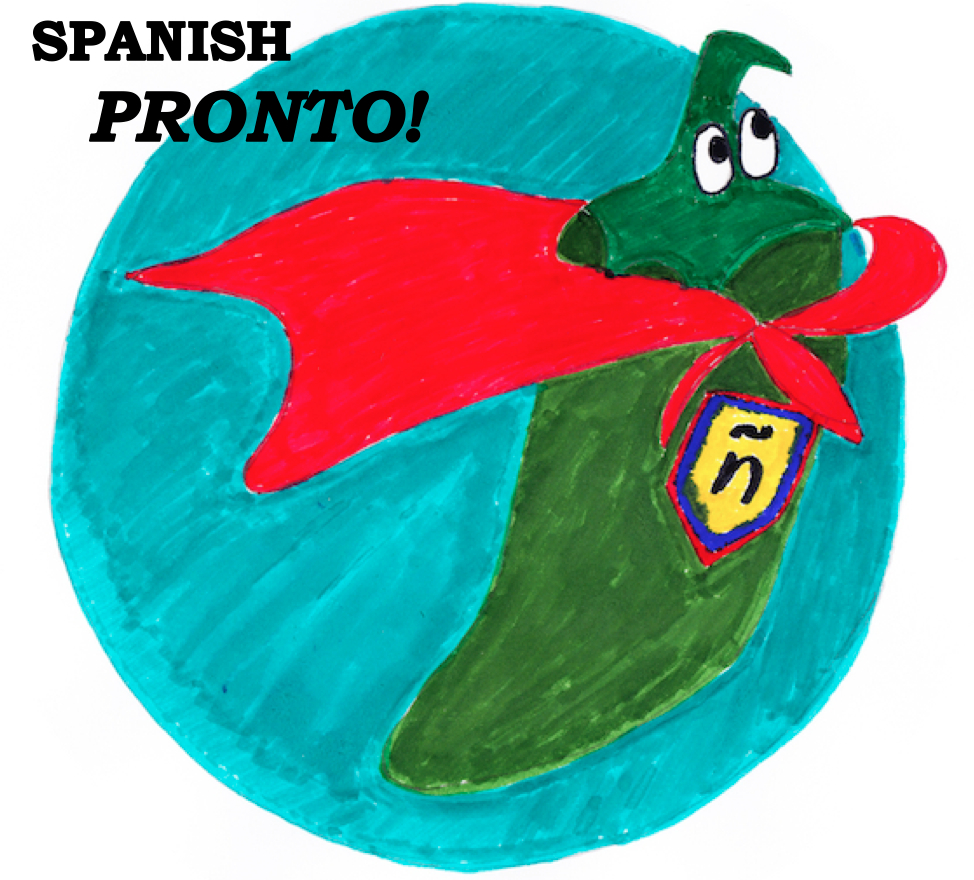
Spanish Vocabulary
Learn 10 Spanish words per day and know 2,500 words after one year!Many words in Spanish and English are similar, but similar words can have very different meanings, so be careful.
| haber to have (aux. v.) | tener to have (possess) | ser to be (essence) | estar to be (stage) | ir to go | hacer to make, to do | |
| yo | he | tengo | soy | estoy | voy | hago |
| tú/vos | has | tienes/tenés | eres/sos | estás | vas | haces/hacés |
| él, ella, usted | ha | tiene | es | está | va | hace |
| nosotros, nosotras | hemos | tenemos | somos | estamos | vamos | hacemos |
| vosotros, vosotras | habéis | tenéis | sois | estáis | vais | hacéis |
| ellos, ellas, ustedes | han | tienen | son | están | van | hacen |
Words pronunciation: 1:22 (82s)
The 20 "words to know" for this lesson are the ones in bold type in the table (haber, he, has, hemos; tengo, tienes, tenemos; soy, eres, somos, sois; estoy, estás, estamos; voy, vas, vamos; hago, haces, hacemos).
The 'vos' (= 'tú' in Argentina, Costa Rica, Nicaragua, etc.) forms tenés, sos, and hacés are included for your information (learn if you want). [The vos forms of haber, estar, and ir are identical to the tú forms (has, estás, and vas).]
The 'vosotros' (= 'y'all' in Spain) forms are also included just for your information. 'Hab&eaucte;is' and 'sois' are the only ones that appear in the 10,000 most common Spanish words; neither appears in the first 2,500.
All the other words that are not in bold type are ones that already appeared in earlier lessons.
If you want to learn Spanish "thoroughly," in the sense of being able to speak it correctly in any country, it is better to learn the 'vos' (='tú') and 'vosotros' (='y'all') forms from the beginning. When you get to Spain, or Argentina, or other places, you will be very glad you learned all of Spanish, and not just some of it.
The verbs in the table are shown in their present tense conjugations. That is, these are the forms you use to describe these actions when they occur now. For example, "I go, you go, he goes, she goes, it goes, you(formal) go, we go, y'all go, they go, you all(formal) go."
Although there is a way, in Spanish, that looks structurally like the English "I am going, you are going, he is going, etc.," and can sometimes correctly be used that way (when someone is, truly, at that very moment, in the very process of performing the action), the far, far, far more common way to convey these meanings in Spanish is to just use the present tense. So, to say "I am going to the store," just say "Voy a la tienda."
Similarly, the way to convey the English "-ing" meaning—when it is acting as a noun (English "gerund")—is often with the Spanish infinitive (-AR, -ER, or -IR) form of the verb, rather than the form that looks structurally more like the English "-ing." So, "ir" means "to go," but it also means "going." ('Mis actividades favoritas son leer, comer y esquiar'. = 'My favorite activities are reading, eating, and skiing.')
dice haberlos visto ayer he says he saw them yesterday ('he says having-them seen yesterday')este año he leído veinte libros this year I have read twenty books
¿has visto esta película? have you seen this movie?
hemos pedido una pizza we have ordered a pizza
tengo hambre/sed/sueño/miedo/calor/frío I am hungry/thirsty/sleepy/scared/hot/cold ('I have hunger/thirst/sleepiness/fear/heat/cold')
¿cuántos hermanos tienes? how many brothers and sisters do you have?
este fin de semana tenemos que ir al mercado this weekend we have to go to the market
de día soy espía, de noche soy profesora de inglés by day I am [a] spy, by night I am [an] English teacher
toda mi esperanza eres tú, eres tú my every hope is you, is you ('all my hope are you, are you') —Eres tú, Mocedades
en mi familia somos hinchas del River in my family we are fans of River Plate
vosotras sois mis mejores amigas y'all are my best (girl)friends
en este momento estoy caminando hacia la catedral right now I am walking towards the cathedral
¿estás hablando en serio? are you serious? ('are you talking in seriousness?')
ya estamos en el aeropuerto we are already at the airport
voy a regresar a las cinco I am going to return at 5:00
me vas a hacer llorar you are going to make me cry ('to me you are going to make cry') —Marco Antonio Solís
¿adónde vamos? where are we going? OR where shall we go? ('to where…')
todo lo que hago sale bien everything I do turns out well ('all that which I do turns out well')
¿qué haces? What are you doing?
cuando nieva mucho hacemos muñecos de nieve when it snows a lot we make snowmen
Examples pronunciation: 1:32 (92s)
© 2017-2018 Chris Marquardt, Spanish Pronto
http://www.spanishpronto.com/vocabulary_0001.html
http://www.spanishpronto.com/vocabulary_0002.html
http://www.spanishpronto.com/vocabulary_0003.html
http://www.spanishpronto.com/vocabulary_0004.html
http://www.spanishpronto.com/vocabulary_0005.html
http://www.spanishpronto.com/vocabulary_0006.html
http://www.spanishpronto.com/vocabulary_0007.html
http://www.spanishpronto.com/vocabulary_0008.html
http://www.spanishpronto.com/vocabulary_0009.html
http://www.spanishpronto.com/vocabulary_0010.html
http://www.spanishpronto.com/vocabulary_0011.html
http://www.spanishpronto.com/vocabulary_0012.html
http://www.spanishpronto.com/vocabulary_0013.html
http://www.spanishpronto.com/vocabulary_0014.html
http://www.spanishpronto.com/vocabulary_0015.html
http://www.spanishpronto.com/vocabulary_0016.html
http://www.spanishpronto.com/vocabulary_0017.html
http://www.spanishpronto.com/vocabulary_0018.html
http://www.spanishpronto.com/vocabulary_0019.html
http://www.spanishpronto.com/vocabulary_0020.html
http://www.spanishpronto.com/vocabulary_0021.html
http://www.spanishpronto.com/vocabulary_0022.html
http://www.spanishpronto.com/vocabulary_0023.html
http://www.spanishpronto.com/vocabulary_0024.html
http://www.spanishpronto.com/vocabulary_0025.html
http://www.spanishpronto.com/vocabulary_0026.html
http://www.spanishpronto.com/vocabulary_0027.html
http://www.spanishpronto.com/vocabulary_0028.html
http://www.spanishpronto.com/vocabulary_0029.html
http://www.spanishpronto.com/vocabulary_0030.html
http://www.spanishpronto.com/vocabulary_0031.html
http://www.spanishpronto.com/vocabulary_0032.html
http://www.spanishpronto.com/vocabulary_0033.html
http://www.spanishpronto.com/vocabulary_0034.html
http://www.spanishpronto.com/vocabulary_0035.html
http://www.spanishpronto.com/vocabulary_0036.html
http://www.spanishpronto.com/vocabulary_0037.html
http://www.spanishpronto.com/vocabulary_0038.html
http://www.spanishpronto.com/vocabulary_0039.html
URL for this page: http://www.spanishpronto.com/vocabulary_0026.html